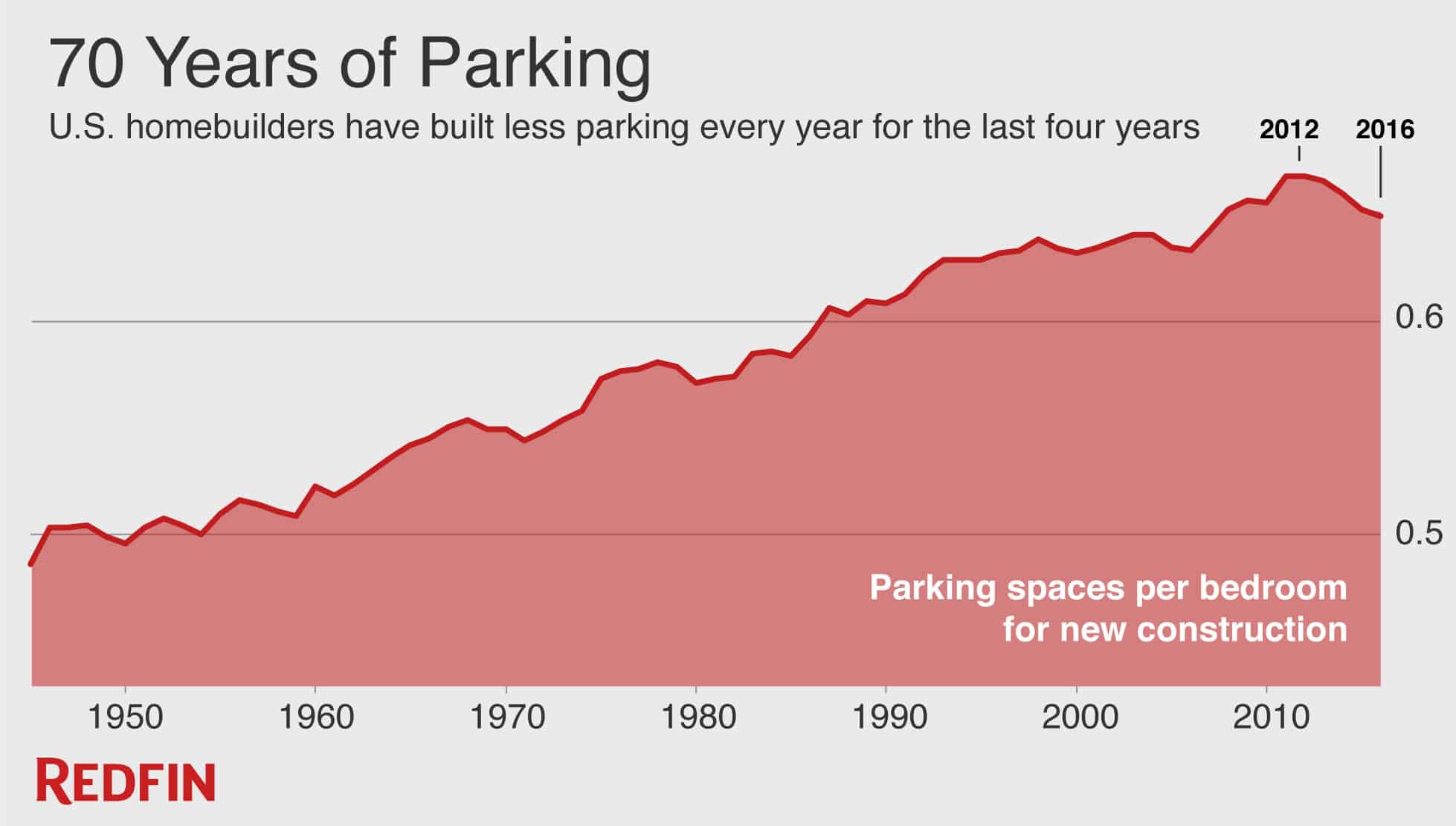Key Findings
- Construction of residential parking spaces peaked in 2012.
- Builders will provide more housing and less parking across the U.S. next year as more cities start letting developers decide how much parking to build.
Still Lots of Parking, But Dropping Fast
Less parking will be built for 2017’s new homes than was built for this year’s new homes. This will make next year the fifth year in a row that builders constructed less parking per bedroom than they did the prior year, reversing a trend that goes back at least 70 years.

Previous dips in the amount of parking provided with new homes were short lived and followed events like the oil shock of the 1970s. This time it’s different. Today’s decline in the amount of parking being built in new homes follows a drop in oil and gasoline prices, which theoretically puts driving—and parking—in higher demand.
The driving force this time isn’t car ownership or gas prices. It’s policy. Cities are finally relaxing minimum parking requirements that specify how much parking builders must provide when they make new homes.
How Black Friday Made Housing More Expensive
Most U.S. cities set minimum parking requirements that make it illegal to build housing without a specific—but arbitrary—number of parking spaces, even though replacing parking minimums with maximums would lower the cost of new home construction.
Minimum parking requirements hatched decades ago when planners looked at the peak parking demand at a few suburban locations on Black Friday. The idea was that mall parking lots without pedestrian or transit access should be big enough to fit all the cars that showed up during the busiest shopping hour of the year, even if that meant most parking spaces would be empty 364.96 days every year.
Like lemmings walking into the sea, almost all U.S. cities then adopted minimum parking requirements for new construction, even for housing, and even if there was great pedestrian, bicycling and transit access. This makes all housing more expensive and difficult to build. Redfin data from Seattle this year shows that one parking space can increase the price of a single new home by $50,000. That’s more money than the annual income of 38 percent of Seattle households, according to data from the U.S. Census. And more than one-third of all Seattle households do not own a single car.
How Homebuilders React to Parking Policies
Dozens of U.S. cities are trying a new approach. Cities from New York to Seattle are leading the way and letting builders decide how much parking to provide, instead of dictating it for them. This unlocks a land bank of surface parking, and it still gives people the option to build parking if they think it’s worth it.
History shows that when minimum parking requirements are removed, a good thing happens: builders make more housing, and the cost of construction goes down. In downtown Los Angeles, 6,000 new homes were built shortly after the parking minimums were relaxed, something that would have been illegal under the old parking rules. In other cities where minimum parking requirements are being removed, this type of magic is now possible because it’s less expensive and easier to fit homes on a small infill lot than fit homes plus a lot of parking.
Method and Data
Redfin looked at millions of homes in the U.S. and summarized their attributes.
Other popular posts:
1. The Parent’s Guide to Creating a Baby-Safe Home Interior
2. How-To-Guide for Helping Your Kids Become City Dwellers
3. The Art and Science of Homeschooling: What You Need to Know

 United States
United States Canada
Canada